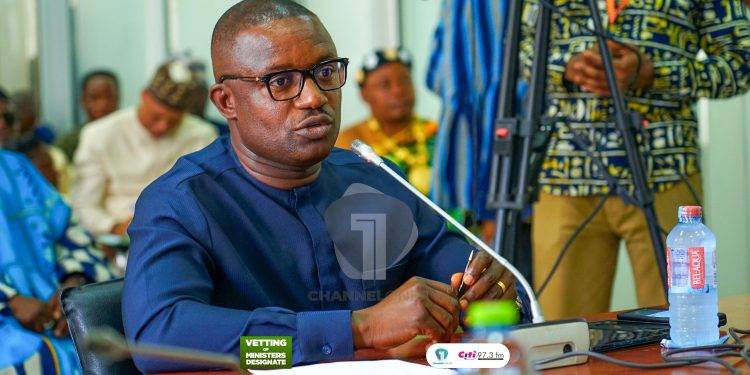Energy Minister-Designate John Abdulai Jinapor has sounded the alarm on a critical issue facing Ghana's electricity sector: nearly three million smart prepaid meters are malfunctioning, leaving millions of electricity consumers frustrated and underserved.
Speaking during his vetting by Parliament’s Appointments Committee on January 13, 2025, Jinapor disclosed that 2.9 million faulty meters urgently need replacement to meet market demands and alleviate the challenges faced by consumers. He emphasized the importance of resolving this issue as a priority to restore confidence in the energy sector and ensure consistent access to electricity across the country.
A Nation Grappling with Faulty Meters
According to Jinapor, the Electricity Company of Ghana (ECG) manages approximately 5.2 million meters nationwide, of which 4.8 million are active. However, the staggering revelation that nearly 60% of these active meters are not functioning properly has raised concerns about the efficiency of Ghana's electricity distribution system.
"The ideal way is to prepare meters, especially smart meters that can mimic all the requirements customers need," Jinapor explained. "From my discussions with ECG, it is evident that about 3 million of these meters are malfunctioning. Addressing this issue will require the immediate replacement of at least 2.9 million meters to satisfy current market demand."
The malfunctioning meters have caused significant inconveniences for consumers, who are already grappling with the broader challenges of irregular electricity supply and rising tariffs. Many customers have expressed frustration over the delays and bureaucratic hurdles involved in acquiring new or replacement meters, further exacerbating the situation.
Exploring Technological Advancements
Jinapor highlighted the need to embrace technological advancements to address the challenges posed by the faulty meters. He suggested a structured approach that includes allowing consumers to purchase their own meters, thereby reducing dependence on ECG’s supply chain and accelerating the replacement process.
"Technology is advancing rapidly, and we need to leverage it to enhance our service delivery. One possibility we are exploring is selling the meters directly to customers. This will not only address the immediate demand but also empower consumers to take control of their electricity needs," he said.
The Minister-Designate also underscored the importance of investing in modern, smart meters that are durable and equipped with advanced features to enhance accuracy and reliability.
Impact on Consumers and the Economy
The widespread malfunctioning of meters has far-reaching implications for both consumers and the national economy. For consumers, faulty meters often lead to inaccurate billing, disputes over electricity usage, and frequent power interruptions. These challenges disrupt households and businesses alike, hindering productivity and economic growth.
On a broader scale, the inefficiencies in the metering system contribute to revenue losses for ECG, exacerbating the company’s financial woes. The energy sector is already grappling with a debt burden of $3 billion, and addressing the metering issue is seen as a critical step toward improving revenue collection and financial stability.
A Call for Immediate Action
Jinapor has pledged to tackle the issue head-on if approved as Energy Minister. He assured the Appointments Committee that he would prioritize the procurement and distribution of new meters, streamline the replacement process, and address the systemic challenges that have hindered progress in the past.
"I am committed to resolving this issue as a matter of urgency. We cannot afford to let millions of Ghanaians suffer due to a lack of functional meters. This is not just about fixing faulty equipment; it’s about restoring trust and confidence in our energy sector," he stated.
The Minister-Designate also called for greater accountability and efficiency within ECG, urging the company to adopt best practices and improve its service delivery to meet the needs of consumers.
Public Reaction and Expectations
The revelation of the scale of the metering problem has sparked widespread concern among Ghanaians, with many calling for immediate and decisive action. Civil society organizations, consumer advocacy groups, and industry stakeholders have urged the government to prioritize the issue and ensure transparency in the procurement and distribution of new meters.
"We’ve been dealing with these problems for far too long," said Ama Kusi, a resident of Kumasi. "It’s about time the government took concrete steps to fix the system and ensure that we have access to reliable electricity without unnecessary delays."
Some experts have also suggested that the government consider alternative models, such as public-private partnerships, to expedite the replacement of faulty meters and improve overall efficiency in the energy sector.
A Broader Vision for the Energy Sector
Beyond the immediate challenge of fixing faulty meters, Jinapor emphasized the need for a comprehensive approach to reforming Ghana's energy sector. He outlined his vision for a sector that is efficient, financially sustainable, and capable of meeting the growing demands of a modern economy.
"This issue is just one piece of a larger puzzle," he said. "We need to address the root causes of inefficiency, invest in modern infrastructure, and adopt innovative solutions to ensure that our energy sector is not only reliable but also sustainable in the long term."
The Path Forward
As the nation awaits the official confirmation of John Jinapor as Energy Minister, the spotlight remains on his ability to deliver on his promises and address the critical challenges facing the energy sector. The malfunctioning meters represent a significant test of his leadership, but they also present an opportunity to demonstrate a commitment to reform and progress.
For now, Ghanaians remain hopeful that swift and decisive action will be taken to resolve the issue and usher in a new era of reliability and efficiency in the country’s electricity distribution system. The road ahead may be challenging, but the resolve to fix the system has never been stronger.




No comments yet
Be the first to share your thoughts!